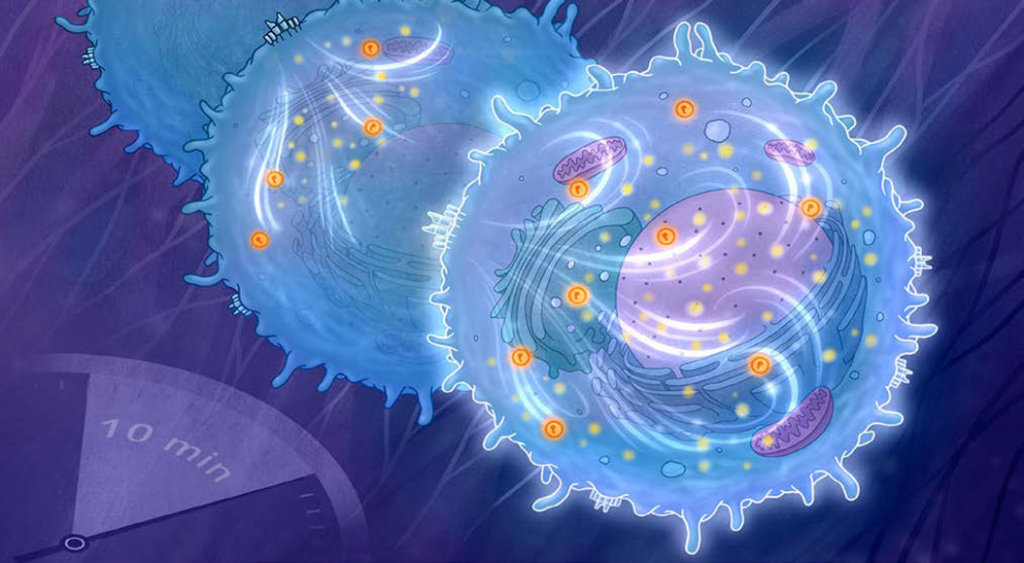Proteomics and Mass Spectrometry of Biomolecules

Group Leader
The objective of the group is to develop efficient strategies in mass spectrometry (MS)-based proteomics and structural MS, associated to dedicated bioinformatics tools, to obtain new insights into protein function, regulation and dynamics. Our main projects focus on studying the role of proteasome, characterizing mycobacterial proteins, and deciphering signaling pathways in immune cells.
We are expert in large-scale quantitative proteomics, structural mass spectrometry, and bioinformatics for the in depth study of proteomes and signaling pathways, and for the characterization of pivotal proteins and protein complexes, like the proteasome.

Proteomics and structural MS represent complementary and powerful approaches for the understanding of complex biological systems. MS is a key technology in proteomic strategies offering various platforms with specific capabilities continuously improving in terms of sensitivity, mass resolution and acquisition speed. Major advances in proteomics and structural MS can also be attributed to the optimization of biochemical protocols and analytical methods for sample preparation before data acquisition, and to the development of sophisticated bioinformatics software for efficient data analysis. Based on our expertise in MS and proteomics, research projects are pursued to characterize several biological systems.
Role of human proteasome complexes
We are interested in understanding the structure/activity relationships of human proteasome, a large multi-catalytic complex in charge of intracellular protein degradation and a therapeutic target for some cancers. We developed integrated strategies using in-vivo crosslinking, affinity-purification and quantitative proteomics to characterize the diversity of proteasome complexes and their dynamics in various cells, physiological and pathological contexts. We also designed an MS-based quantitative method to measure the quantities of several proteasome subtypes in patient samples. We then optimized structural MS approaches to determine the structural features that govern protein-protein interactions and allosteric changes during proteasome association to its regulatory protein complexes.
Immunoproteomics
We developed efficient large-scale quantitative proteomic analyses (interactomics, phosphoproteomics) to obtain a detailed characterization of different cells from the adaptative and innate immune systems. This further permits us to get new insights into the molecular mechanisms of the inflammatory and immune responses. Major efforts have been invested to decipher, at the cellular and molecular levels, the functional mechanisms of T lymphocytes. We analysed in mouse primary T cells the signalosome of several key components of the TCR pathway using optimized interactomics and phosphoproteomics strategies.
Characterization of mycobacterial proteins
We are interested in the characterization of proteins and protein complexes that play a role in the formation of the mycomembrane and in the targeting of proteins to the plasma membrane, mycomembrane and extracellular medium. We also developed an expertise in the analysis of O-mannosylated proteins in mycobacteria to study their implication in the virulence of Mycobacterium tuberculosis.
Team members
Research Scientists
Marie-Pierre Bousquet (University)
Manuelle Ducoux (University)
Anne Gonzalez de Peredo (CNRS)
Julien Marcoux (CNRS)
Odile Schiltz (CNRS)
Research Engineers
Renaud Albigot (CNRS)
David Bouyssié (CNRS)
Marie Locard-Paulet (CNRS)
Emmanuelle Mouton (University)
Postdoctoral Fellows
Angelique Dafun
Paulo Espirito-Santo
PhD Students
Pinar Altiner
Amélie Bosc-Rosati
Maurine Marteau
Ronald Siaden-Ortega
Zoltán Udvardy
Our research projects
Role of human proteasome complexes
Immunoproteomics
Characterization of mycobacterial proteins
Lesne et al. (2020) Conformational maps of human 20S proteasomes reveal PA28- and immuno-dependent inter-ring crosstalks. Nat Commun
Bouyssié et al. (2020) Proline: an efficient and user-friendly software suite for large-scale proteomics. Bioinformatics
Locard-Paulet et al. (2020) LymphoAtlas: a dynamic and integrated phosphoproteomic resource of TCR signaling in primary T cells reveals ITSN2 as a regulator of effector functions. Mol Syst Biol
Tonini et al. (2020) Potential plasticity of the mannoprotein repertoire associated to Mycobacterium tuberculosis virulence unveiled by mass spectrometry-based glycoproteomics. Molecules
Zivkovic et al. (2022) Proteasome complexes experience profound structural and functional rearrangements throughout mammalian spermatogenesis. Proc Natl Acad Sci USA
Voisinne et al. (2022) Kinetic proofreading through the multi-step activation of the ZAP70 kinase underlies early T cell ligand discrimination. Nat Immunol

Using high-throughput phosphoproteomic methods, we can monitor the phosphorylation kinetics of thousands of phosphosites during the first 10min following TCR engagement in primary T lymphocytes. (Illustration by SciStories- scistories.com)
Prizes
Mars 2021 – Renaud Albigot is awarded the CNRS crystal medal. Read more… (in French)
Février 2020 – Julien Marcoux is awarded the CNRS bronze medal. Read more… (in French)
The complete list of our publications is available through Pubmed.
We are extremely proud of our former research assistants, PhD students and post-doctoral fellows who are now continuing their career in the best labs, enterprises and institutions in life sciences!
- Dušan Živković | Post-doctoral Fellow, Bolla Lab, Oxford University, UK
- Pascaline Bories | Research Associate, CHU du Québec, Université de Laval, Canada
- Eléonore Bouscasse | Engineer, Institut Pasteur, Paris, France
- Thomas Menneteau |
- Clarisse Gotti | Research Associate, CHU de Québec, Université de Laval, Canada
- Bertrand Fabre | Research Associate, CNRS, Toulouse, France
- Julien Parra | Senior Research Scientist, Evotec, Toulouse, France
- Julie Poisat | Ingénieure en développement logiciel, SPOOM, Toulouse
- Fanny Duguet | Immuno-inflammation Project Leader, Servier, France
- Violette Gautier | Research Scientist/Proteomics Expert, Evotec, Toulouse, France
- Luc Garrigues | Research Scientist in Mass Spectrometry, Evotec, Toulouse, France
- David Bouyssié | Research Engineer in Bioinformatics, CNRS, Toulouse, France
- Mariette Matondo | Proteomics facility Manager, Institut Pasteur, Paris, France
- Audrey Gargaros | Engineer, Evotec, Toulouse
- Sandrine Lise | Technician, GTP Technology, France

